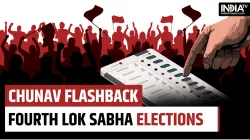Chunav Flashback: How Jan Sangh emerged victorious in Delhi in 1967 Lok Sabha Elections
Chunav Flashback: The fourth Lok Sabha election proved pivotal in reshaping the nation's political landscape, notably with Jan Sangh achieving a remarkable feat by clinching victories in six out of seven parliamentary constituencies in Delhi.

Chunav Flashback: In the vibrant landscape of Indian democracy, few events command attention and anticipation as fervently as the Lok Sabha elections. Serving as the hallmark of participatory governance, these elections symbolize the collective voice of over a billion citizens, resonating across the diverse landscapes of the nation. As the world's largest democratic exercise, the Lok Sabha elections stand as a testament to India's commitment to electoral integrity, inclusivity, and the fundamental principles of representation. With each election cycle, the nation witnesses not only a political spectacle but also a profound reflection of its socio-cultural fabric, aspirations, and evolving narratives.
Story of fourth Lok Sabha elections
The fourth Lok Sabha election marked a significant shift in the nation's electoral landscape, with Jan Sangh making a noteworthy impact by securing victories in six out of seven parliamentary constituencies in Delhi. This triumph marked a first for the party in the national capital. Interestingly, the election dealt a heavy blow to the Congress, which managed to secure only one seat, with a narrow victory margin. Notably, the defeat of incumbent MPs began with this election, as three Congress MPs were ousted.
Naval Prabhakar, a prominent Congress leader with a track record of electoral success, failed to secure a fourth term in Parliament. Additionally, Mir Chand Khanna and Shyam Nath, representing New Delhi and Chandni Chowk respectively, also suffered defeats. However, the Congress found solace in Chaudhary Brahm Prakash, Delhi's first Chief Minister, who secured victory as an MP for the second consecutive term—first from Sadar and subsequently from Outer Delhi.
31 candidates lost their deposits
In the fourth general election, a total of 46 candidates vied for victory, but unfortunately, 15 of them failed to secure enough votes to retain their deposits. Among them were not only the first and second runners-up in all seven constituencies, but also the candidate who came third in the Chandni Chowk area. Consequently, the deposits of 31 candidates were forfeited in this electoral contest.
Reason for Congress' debacle in Delhi
In the context of this election, while the Congress emerged victorious across the nation, it faced a surprising defeat in Delhi. The primary reason behind this setback was attributed to the strained relationship between Indira Gandhi and Chaudhary Brahm Prakash. Brahm Prakash, who had ascended as Delhi's inaugural Chief Minister in 1952, had evolved into a formidable figure within the Congress ranks by the time of this election. He advocated for the nomination of his preferred leaders across all constituencies, but Gandhi, while granting him a ticket, exercised her own discretion in allocating tickets for other seats. This disagreement left Brahmprakash disgruntled, leading him to strategically work against Congress candidates in six seats. Following this electoral outcome, he severed ties with the Congress party altogether.
Results of fourth Lok Sabha elections in Delhi
| CONSTITUENCY | WINNER | PARTY |
| New Delhi | Manohar Lal Sondhi | Jan Sangh |
| North Delhi | Balraj Madhok | Jan Sangh |
| Outer Delhi | Chaudhary Brahm Prakash | Congress |
| East Delhi | H Devgan | Jan Sangh |
| Chandani Chowk | R Gopal | Jan Sangh |
| Delhi Sadar | KL Gupta | Jan Sangh |
| Karol Bagh | RS Vidyarthi | Jan Sangh |
ALSO READ: Chunav Flashback: Atal Bihari Vajpayee lost one election which he was winning due to a rumour